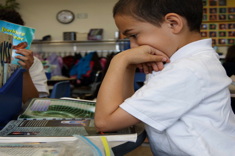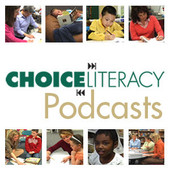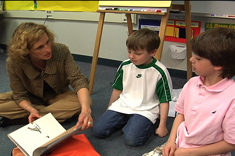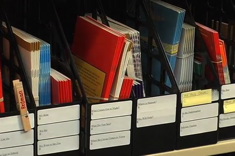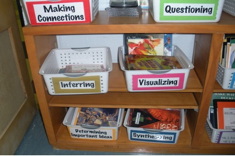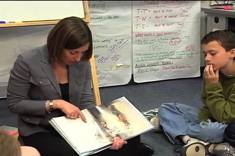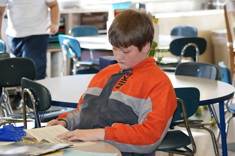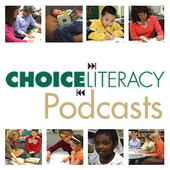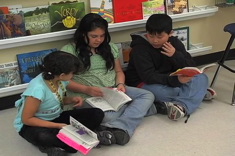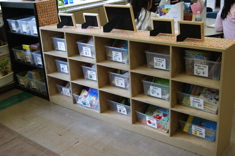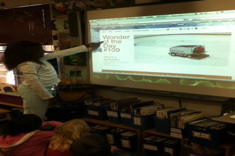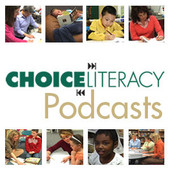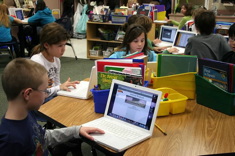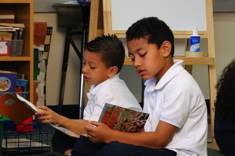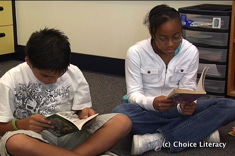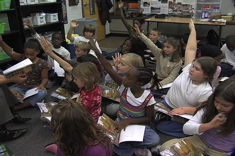Teaching Reading
Our contributors lead reading workshops in classrooms with creative flair. Over the past 12 years, we've filled our site with loads of suggestions, tools, and tips for using engaging books throughout the curriculum to hook kids on reading. Here is where you will find many stories of successful and not-so-successful workshop days, and what we learned from them. We bring these stories to life through hundreds of video examples.
Latest Content
Books, Books, Books
Parents of young children may be drawn to text tied to movies or other pop culture filler books. Trish Prentice shares a letter she sends home to families to encourage even the youngest learners to find books and authors with a little more staying power.
Nonfiction Favorites for Boys (BOOKLIST)
What boy can resist a book titled How They Croaked? If you're looking for some books to fascinate and delight the boys in your classroom, Tony Keefer has some terrific suggestions of recent nonfiction titles in this booklist.
Born Wonders: Tapping Student Interest in Animals, Babies, and Books
Cute Alert – what’s more adorable than babies or animals? Perhaps baby animals! Andrea Smith shares an addictive web resource that will instantly hook students of any age. It’s zoo postings of newborn animals from around the world, with many literacy connections.
No More Excuses: Reading Workshops in Nontraditional Middle and High School Settings
Think you don’t have enough time for reader’s workshop in your classroom? Worried that you don’t have enough books to go around? Feel like you just don’t have the space for it? What if you had students, but no classroom, no books, and no set class times? Ellie Gilbert faced down all these challenges in her nontraditional high school reading workshop.
Patrick Carman on Books and Multimedia (PODCAST)
Patrick Carman is the author of some fascinating multimedia novels for young readers.
Connecting Yoga and Character Traits in Literature Study
If you are a yoga devotee, you will enjoy this feature. Ann Williams discovers yoga and literature mix beautifully as she helps her 4th grade students explore character traits.
Teaching Stamina Strategies to First Graders
Tammy Mulligan works with two seven-year-olds to teach them strategies for building reading stamina.
Strawberries, Fun, and Student Blogging
Andrea Smith evaluates the success of her new student blogging program.
Ready for Guided Reading? A Second Look
Shari Frost updates her original essay on guided reading with her latest thinking and criteria for placing students in guided reading groups.
Caught in the Middle: Tween Books to Excite Readers
What does research tell us about tween readers and capturing their interest in books? Teri Lesesne’s tween booklist integrates the research with recent publications sure to interest young readers.
Rethinking Mentor Texts
Shari Frost writes about the ways our perfectly organized bins may limit the teaching possibilities for many books. She takes readers step by step through her process of determining ways to use a sample mentor text to teach a multitude of lessons and strategies.
New Books to Celebrate Poetry
Franki Sibberson shares some of her favorite new poetry collections in an annotated booklist.
Planning Small Groups to Teach Phonetic Skills
The gap between a child learning a phonetic rule and actually being able to apply it is one that often vexes teachers. Clare Landrigan and Tammy Mulligan find systematic planning and routines for focused small-group work help many of their colleagues succeed in their phonics instruction.
Newbery Club Wrap-Up
Even though their Newbery Club of 5th graders didn't read the winning book in advance, Maria Caplin and Bill Prosser consider the club a success. They close out their series on the club with thoughts on how they will do things differently next fall.
The Amazing School Librarian: An Interview with John Schumacher (PODCAST)
Franki Sibberson interviews extraordinary school librarian and blogger John Schumacher in an inspiring podcast that will get you thinking in new ways about school librarians and their role in your learning community.
Kelly Gallagher on Readicide (PODCAST)
High school teacher and best-selling author Kelly Gallagher talks about "readicide" – what teachers and schools do to systematically kill a love of reading in students.
Writers, Choice and Independence (Part I)
What does true independence look like among young readers and writers? A chance comment from a visitor to Aimee Buckner's classroom gets her pondering the amount of choice children have during units of study.
Great Lead Investigators
Katie Doherty turns her middle school students into lead investigators – an activity that is a terrific combination of mentor texts, group work, and connections to student writing.
It May Be a Mess, But It’s Our Mess: Creating a Student-Organized Classroom Library
Jennifer McDonough explains why it’s important for her to share the sorting, categorizing, and labeling of texts with her students early in the year while organizing the classroom library.
Wonderopolis: Nonfiction, Technology, and Web-Based Independent Learning
Wonderopolis hits the sweet spot so many of us are looking for in web resources for students, delivering free, engaging, high-quality nonfiction text and video in small chunks that can easily be integrated into literacy and science workshops. Andrea Smith explains how she uses Wonderopolis daily with her students.
Spring Reading Interviews (TEMPLATE)
Kindergartners may be too young for reading interviews early in the fall, but Mandy Robek finds spring reading interviews are an excellent bridge to families and summer reading suggestions.
Catching Struggling Readers Before They Fall with Pat Johnson and Katie Keier (PODCAST)
Pat Johnson and Katie Keier share their thoughts on how a comprehensive literacy approach best meets the needs of all learners, especially those students who struggle.
Digital Reading: Another Facet of a Classroom Library
The good news? There are lots of free and low-cost digital books for young readers on the web. The bad news? The quality of many of them is mediocre at best. Andrea Smith highlights three web-based resources for digital books that are affordable and also high quality.
One Book/Four Hands: Mentoring Younger Readers Using Picture Books
Paul Hankins describes the power of pairing high school and elementary students in a partner reading program.
The Power of Checklists in Primary Literacy Workshops
Knowing our most sophisticated professions use checklists to get it right, Clare Landrigan and Tammy Mulligan share and explain checklists that work well for students.
Updating Reading Interviews: Technology and Changing Habits
Reading Interviews are a staple in many literacy programs – a terrific tool for learning more about the history and habits of students. Franki Sibberson explains how she has updated her reading interview to include questions about digital resources and tools.
Raising Readers: Independent Reading, Choices, and Intentional Reading Practices
How can teachers promote good independent reading choices for English language learners? Stella Villalba has suggestions.
Literacy Rights and Responsibilities
Something bad was happening in Katie Doherty’s middle school classroom—it was time to rebuild the class community with a reality check.
Choosing 5th Grade Read Alouds for the New Year
So many wonderful choices, so little time! Karen Terlecky makes her selections for a year of 5th grade read alouds.
Next Steps: Thinking about Retelling During Reading
Retelling is an essential skill for readers, and it’s one that is crucial for success on most state exams too. In Part 2 of a two-part series, Clare Landrigan and Tammy Mulligan share strategies and sample lessons in this installment.
Browse Content By
Type
Category
- Assessment Tools
- Big Fresh Archives
- Booklists
- Choice Numeracy
- Classroom Design
- Common Core
- Community Building
- Conferring
- Content Literacy
- Digital Literacy
- English Language Learners
- Equity
- Family Relations
- Free Samples
- Guiding Groups
- Leadership
- Literacy Coaches
- Mentor Texts
- Minilessons
- New Teacher Mentors
- Podcasts
- Poetry
- Quote Collections
- Reading Strategies
- Self Care
- Struggling and Striving Learners
- Talking and Listening
- Teacher Study Groups
- Teaching Reading
- Teaching Writing
- Word Study and Vocabulary
Author
- Melissa Quimby
- Nawal Qarooni
- Gwen Blumberg
- Julie Cox
- The Lead Learners
- Hannah Tills
- Josie Stewart
- Ruth Metcalfe
- Mallory Messenger
- Becca Burk
- Jodie Bailey
- Vivian Chen
- Mary Brower
- Tiffany Abbott Fuller
- Stephanie Affinito
- Ruth Ayres
- Leigh Anne Eck
- Heather Fisher
- Shari Frost
- Julie Johnson
- Suzy Kaback
- Gigi McAllister
- Shirl McPhillips
- Melanie Meehan
- Cathy Mere
- Debbie Miller
- Tara Barnett and Kate Mills
- Tammy Mulligan
- Dana Murphy
- Bitsy Parks
- David Pittman
- Brenda Power
- Heather Rader
- Matt Renwick
- Mandy Robek
- Christy Rush-Levine
- Gretchen Schroeder
- Jen Schwanke
- Brian Sepe
- Katherine Sokolowski
- Stella Villalba
- Jennifer Vincent
Grade Level
Choice Literacy Membership
Articles
Get full access to all Choice Literacy article content
Videos
Get full access to all Choice Literacy video content
Courses
Access Choice Literacy course curriculum and training


